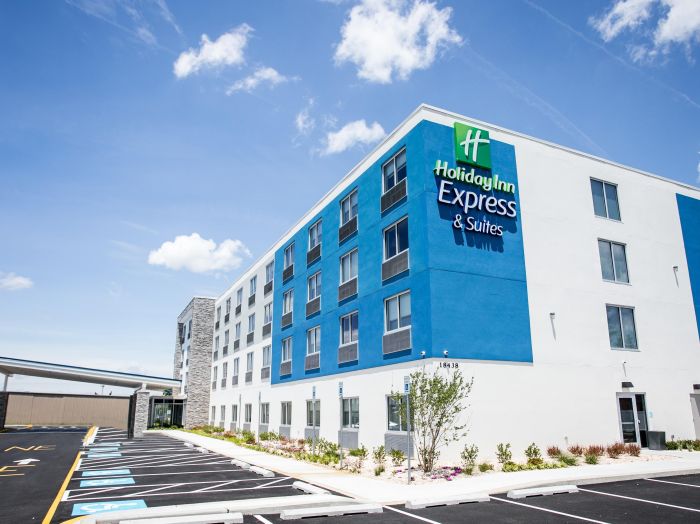Hotel Deals and Discounts Your Guide to Savings
Hotel Deals and Discounts unlock incredible travel opportunities, transforming expensive getaways into affordable adventures. This guide explores various types of hotel deals, effective search strategies, and crucial factors influencing prices, empowering you to find the perfect accommodation at the best possible rate. We’ll cover everything from understanding deal restrictions to maximizing your savings and avoiding hidden fees, ensuring a smooth and budget-friendly travel experience.
From budget-conscious backpackers to luxury-loving couples, everyone can benefit from knowing how to snag a great hotel deal. We’ll delve into the strategies used by savvy travelers to secure the best rates, whether it’s utilizing price comparison websites, negotiating directly with hotels, or leveraging loyalty programs. Understanding the factors that impact hotel pricing—seasonality, location, and demand—is key to timing your booking perfectly.
This guide provides the knowledge and tools to navigate the world of hotel deals with confidence.
Types of Hotel Deals

Source: ihg.com
Finding the perfect hotel at the perfect price can feel like searching for a needle in a haystack. Luckily, numerous deals and discounts exist to make your travel dreams a reality. Understanding the different types of hotel deals available allows you to strategically plan your trips and maximize your savings. This section will explore five common types of hotel deals, their associated conditions, and which traveler profiles benefit most.
Advance Purchase Discounts
Advance purchase discounts reward travelers who book their hotel rooms well in advance of their stay. Hotels offer these deals to secure bookings and manage their occupancy rates effectively. These deals often provide significant savings compared to booking closer to the travel dates. The main restriction is the non-refundable nature of the booking; cancellations usually result in forfeiture of the entire payment.
These deals are ideal for travelers with firm travel plans, particularly those who are less concerned about unforeseen circumstances that might necessitate a change in plans. Families planning a long-awaited vacation or business travelers with confirmed trips would find this deal type particularly advantageous.
Last-Minute Deals
In contrast to advance purchase discounts, last-minute deals target travelers who book their accommodations close to their check-in date. Hotels offer these deals to fill empty rooms and avoid revenue loss. While last-minute deals can sometimes offer significant savings, the availability of rooms is limited and the selection may be restricted to less desirable rooms or less popular hotels.
The lack of flexibility in terms of dates and specific room types is a significant restriction. Budget-conscious travelers, spontaneous adventurers, or those whose travel plans are less fixed might find these deals appealing.
Package Deals
Package deals bundle hotel stays with other travel services, such as flights, car rentals, or activities. This type of deal offers convenience and often provides cost savings compared to booking each service separately. Restrictions might include fixed travel dates, specific flight or activity options, and limitations on changes or cancellations. Families traveling together or couples on romantic getaways will find package deals particularly attractive due to their bundled convenience and potential cost savings.
Business travelers might also benefit if the package includes business-related services.
Loyalty Program Discounts
Many hotel chains offer loyalty programs that reward repeat customers with discounts, upgrades, and other perks. These programs require membership and often involve accumulating points or nights stayed to unlock benefits. Restrictions can include specific membership tiers required for certain discounts, blackout dates, and limited availability of reward options. Frequent travelers, both business and leisure, will greatly benefit from loyalty programs, accumulating points over time to redeem for substantial savings and enhanced travel experiences.
Seasonal Discounts
Seasonal discounts reflect the fluctuating demand for hotel rooms throughout the year. Hotels often offer lower prices during the off-season (typically excluding peak tourist seasons and holidays) to attract guests. Restrictions might include limited availability of specific room types or amenities during the off-season. This type of deal is especially appealing to budget-conscious travelers and those who are flexible with their travel dates, allowing them to explore destinations during less crowded times.
| Deal Type | Description | Typical Restrictions | Target Audience |
|---|---|---|---|
| Advance Purchase | Discounted rates for booking well in advance. | Non-refundable, limited flexibility. | Families, business travelers with confirmed plans. |
| Last-Minute | Discounted rates for booking close to arrival. | Limited availability, less desirable rooms. | Budget travelers, spontaneous travelers. |
| Package Deals | Bundled hotel stay with other travel services. | Fixed dates, limited options, restrictions on changes. | Families, couples, business travelers (depending on included services). |
| Loyalty Program | Discounts and perks for repeat customers. | Membership required, blackout dates, tier restrictions. | Frequent travelers (business and leisure). |
| Seasonal | Discounted rates during off-peak seasons. | Limited availability, specific room types. | Budget travelers, flexible travelers. |
Finding Hotel Deals
Securing a discounted hotel room can significantly enhance your travel experience, allowing you to allocate more of your budget to activities and enjoyment. Finding the best deals requires a strategic approach, combining online savvy with direct negotiation skills. This section will Artikel effective strategies for finding and securing those coveted discounted hotel rooms.
Effective Online Strategies for Finding Discounted Hotel Rooms
Several online techniques consistently yield significant savings on hotel bookings. These methods leverage the competitive nature of the online travel market to your advantage.
- Utilize Price Comparison Websites: Websites like Kayak, Expedia, Google Hotels, and Trivago aggregate hotel rates from various booking platforms, allowing you to compare prices quickly and easily. This eliminates the need to check each site individually, saving you considerable time and effort.
- Employ Incognito Browsing: Many booking websites utilize cookies to track your searches and potentially inflate prices based on your browsing history. Incognito or private browsing mode prevents this tracking, potentially revealing lower rates.
- Be Flexible with Your Travel Dates: Hotel prices fluctuate based on demand. Experimenting with slightly earlier or later travel dates can often uncover significant price drops, especially during shoulder seasons (periods before and after peak tourist times).
Using Price Comparison Websites Effectively
Mastering price comparison websites is key to securing the best hotel deals. This step-by-step guide will optimize your search.
- Enter your desired destination and travel dates: Be specific with your location and dates to get the most accurate results.
- Specify your needs: Filter your search based on star rating, amenities (e.g., free Wi-Fi, parking), and other preferences. This refines your results and focuses on hotels that meet your criteria.
- Compare prices across multiple sites: Don’t just look at the first few results. Examine several options, paying close attention to the total cost, including taxes and fees.
- Read reviews: Check reviews from previous guests to assess the hotel’s cleanliness, service, and overall value.
- Book directly with the hotel if possible: While comparison websites offer convenience, booking directly with the hotel may sometimes yield better rates or allow for more flexible cancellation policies.
Negotiating Lower Rates Directly with Hotels
Direct negotiation can sometimes unlock hidden discounts not available through online booking platforms.
Directly contacting hotels, particularly during off-peak seasons or when booking multiple rooms, can lead to significant savings. Clearly state your desired dates, the number of guests, and any specific needs. Politely inquire about any available discounts or special offers. Mentioning competitor rates can sometimes incentivize the hotel to match or beat the price. Remember to be respectful and professional throughout the negotiation process.
A Flowchart for Finding and Booking a Hotel Deal
The following flowchart visually represents the process of securing a hotel deal, from initial search to final booking.
[Imagine a flowchart here. The flowchart would start with “Start,” branch to “Use Price Comparison Websites” and “Contact Hotels Directly,” then both would lead to “Compare Prices and Amenities,” followed by “Read Reviews,” then “Book Hotel,” and finally “End.”]
Factors Influencing Hotel Pricing
Hotel room prices are rarely static; they fluctuate based on a complex interplay of factors. Understanding these influences can help you snag the best deals. This section will explore the key elements that determine how much you’ll pay for a hotel room.
Several key factors significantly impact hotel pricing. These factors interact with each other, creating a dynamic pricing landscape. Understanding these influences allows for more strategic booking and potentially substantial savings.
Seasonality
The time of year dramatically affects hotel prices. Peak seasons, such as summer holidays, major festivals, and school breaks, usually command higher rates due to increased demand. Conversely, off-season periods, typically during the colder months or immediately after major holidays, often offer lower prices as hotels compete for fewer guests. For example, a beachfront hotel in Florida will likely charge significantly more during the summer than in the winter.
Similarly, hotels near ski resorts will see higher prices during the ski season.
Location
A hotel’s location is a major determinant of its price. Hotels in prime locations, such as city centers, popular tourist attractions, or near major transportation hubs, tend to be more expensive due to higher demand and perceived value. Hotels in less central or less desirable areas typically charge lower rates. A hotel in the heart of Times Square in New York City will undoubtedly cost more than a comparable hotel located several miles outside the city center.
Demand
The level of demand for hotel rooms directly influences pricing. High demand, driven by events, conferences, or popular tourist seasons, leads to higher prices as hotels can command premium rates. Conversely, low demand results in lower prices as hotels try to fill their rooms. For instance, a hotel near a major convention center will significantly increase its prices during the convention, then return to lower prices once the event concludes.
Events and Special Occasions
Special events and occasions significantly impact hotel pricing. Major conferences, concerts, festivals, and sporting events often drive up prices as hotels capitalize on the increased demand. Hotels near the venue of a large-scale event will often implement dynamic pricing, adjusting rates based on real-time demand and availability. For example, hotels near a major music festival will see a spike in prices during the festival weekend.
Similarly, hotels in cities hosting major sporting events like the Super Bowl or the Olympics will see dramatic price increases.
Budget Hotels versus Luxury Hotels Pricing Strategies
Budget and luxury hotels employ different pricing strategies. Budget hotels focus on affordability, offering basic amenities at competitive prices. They often utilize strategies like bulk discounts and consistent, lower pricing to attract price-sensitive travelers. Luxury hotels, on the other hand, emphasize exclusivity and premium services. They tend to maintain higher prices, even during periods of lower demand, focusing on delivering a high-end experience to their clientele.
A budget hotel might offer a consistent nightly rate of $50, while a luxury hotel might range from $300 to $1000 depending on the season and demand.
Booking and Managing Hotel Deals
Securing the best hotel deals involves more than just finding a low price; it requires a smooth booking process and careful management to avoid unexpected costs. Understanding the various booking methods, potential hidden fees, and the importance of reviewing the fine print are crucial steps to a successful and stress-free hotel stay.
The Hotel Booking Process
Booking a hotel deal can be done through various methods, each with its own advantages and disadvantages. Online booking platforms, such as Expedia, Booking.com, and Hotels.com, offer a vast selection of hotels and deals, often with user reviews and comparison tools. These platforms typically involve selecting your dates, location, and desired amenities, then reviewing available options and prices before proceeding to payment and reservation confirmation.
Offline booking, through direct contact with the hotel or through travel agents, allows for more personalized service and potential negotiation, but might offer less choice or require more effort. Regardless of the method, always confirm the details of your reservation, including the total price, cancellation policy, and any included amenities.
Avoiding Hidden Fees and Charges, Hotel Deals and Discounts
Hidden fees can significantly inflate the initial price of a hotel deal. To avoid these surprises, carefully examine the total price displayed before confirming your booking. Look for extra charges for things like resort fees, parking, Wi-Fi, or early check-in/late check-out. Some websites clearly list all inclusive fees, while others might bury them in the fine print. It’s also advisable to inquire about any potential local taxes that might be added to your bill.
For example, a resort fee might include access to amenities like a pool or fitness center, but this should be clearly stated. Be wary of deals that seem too good to be true, as they might be hiding significant extra costs.
The Importance of Reading the Fine Print
Before confirming any hotel reservation, meticulously read the terms and conditions. This crucial step can prevent unexpected issues and save you from potential financial burdens. Pay close attention to the cancellation policy, as penalties for cancellations can vary greatly. Understand the check-in and check-out times, as well as any restrictions on guests or amenities. For instance, a non-refundable reservation might seem cheaper initially, but you’ll lose the entire amount if you need to cancel.
Similarly, a strict cancellation policy might prevent you from changing your dates if your plans change. Reading the fine print ensures you are fully aware of your rights and responsibilities.
Booking Checklist
A structured approach to booking ensures a smoother process and minimizes potential problems. This checklist covers the key steps involved before, during, and after booking.
- Before Booking: Research different hotels and deals, compare prices and amenities, check reviews, and understand cancellation policies.
- During Booking: Carefully review the total price, including any potential hidden fees, read the terms and conditions thoroughly, and confirm all details of your reservation.
- After Booking: Receive confirmation, print or save a copy of your reservation, and double-check the check-in and check-out times.
Maximizing Value from Hotel Deals: Hotel Deals And Discounts
Securing a great hotel deal is only half the battle; maximizing its value is where the real savings and enjoyment lie. Smart planning and strategic choices can significantly enhance your overall experience and stretch your travel budget further. This section explores practical strategies to get the most out of your discounted hotel stay.
By proactively planning and taking advantage of available resources, you can transform a simple discounted hotel stay into a truly memorable and cost-effective vacation. This involves not only focusing on the initial deal but also leveraging the hotel’s offerings and exploring ways to minimize additional expenses.
Leveraging Hotel Amenities and Services
Many hotels offer complimentary amenities and services that can significantly enhance your stay without adding to your expenses. Taking advantage of these often-overlooked perks can make a considerable difference. For example, free breakfast can save you a substantial amount of money compared to eating out each morning. Similarly, utilizing the hotel’s fitness center, pool, or business center avoids the need for separate gym memberships or co-working space rentals.
Look for hotels that provide free airport shuttles or offer discounts on local attractions – these can add significant value to your overall hotel deal.
Saving Money on Other Travel-Related Expenses
A discounted hotel rate is a fantastic start, but further cost savings can be achieved by considering other travel aspects. Packing snacks and drinks for some meals can reduce reliance on expensive hotel room service or nearby restaurants. Utilizing public transportation instead of taxis or ride-sharing services can also dramatically lower your overall travel costs. Researching free activities in the area, such as walking tours or visiting parks, can provide entertainment without emptying your wallet.
Consider purchasing a city pass for access to multiple attractions at a discounted rate, often a better deal than buying individual tickets.
Utilizing Loyalty Programs and Rewards Points
Hotel loyalty programs are invaluable for frequent travelers. These programs often offer discounted rates, free upgrades, and other perks to members. Accumulating points through multiple stays can eventually lead to free nights or other significant rewards. Consider consolidating your hotel stays with a single loyalty program to maximize points accumulation and redeem rewards more quickly. Check for bonus point promotions or partner offers that can accelerate your point earning.
Many credit cards also offer bonus points on hotel spending, further enhancing the value of your loyalty program participation. Strategically using these points can effectively reduce or even eliminate your hotel costs on future trips.
Illustrative Examples of Hotel Deals

Source: loyaltylobby.com
Finding the right hotel deal can significantly reduce your travel costs. Understanding the different types of deals and how they work is key to saving money on your next vacation or business trip. The following examples illustrate the potential savings and benefits associated with various hotel offers.
Hotel Deals Examples
| Deal Scenario | Description | Cost Breakdown |
|---|---|---|
| Early Bird Discount | This deal rewards travelers who book their hotel rooms well in advance. For example, a hotel might offer a 20% discount on a room costing $150 per night if booked at least 60 days prior to arrival. This incentivizes early planning and allows the hotel to better manage occupancy. |
|
| Package Deal (Hotel + Flights) | Many travel agencies and online booking platforms offer package deals that bundle hotel stays with flights. This often results in a lower overall price than booking flights and hotels separately. For example, a 5-night stay in a resort in Cancun, including round-trip flights from New York City, might cost $1200 instead of $1500 if booked individually. This is because the package provider often negotiates bulk discounts with airlines and hotels. |
|
| Loyalty Program Discount | Hotel loyalty programs reward frequent guests with discounts and other perks. For instance, a hotel chain might offer a 15% discount to members who have stayed at least 10 nights in the past year. This encourages repeat business and builds customer loyalty. Assume a member books a room normally costing $200 per night. |
|
Closure
Securing fantastic hotel deals isn’t about luck; it’s about strategy. By understanding the different types of deals available, employing effective search techniques, and being aware of the factors influencing prices, you can significantly reduce your travel costs. Remember to always read the fine print, avoid hidden fees, and leverage loyalty programs to maximize your savings. With a little planning and the right knowledge, your dream vacation is within reach, without breaking the bank.
Happy travels!
Frequently Asked Questions
How far in advance should I book a hotel for the best deals?
Generally, booking 2-3 months in advance offers good deals, but last-minute deals or early bird offers can also be beneficial depending on the season and location.
Are hotel deals usually refundable?
Refundability varies greatly depending on the hotel, the deal type, and the booking platform. Always check the cancellation policy before booking.
Can I combine hotel deals with other travel discounts?
Sometimes! Check the terms and conditions of both the hotel deal and other discounts (like airline miles or travel packages) to see if they are stackable.
What are some common hidden fees to watch out for?
Resort fees, parking fees, and Wi-Fi charges are common hidden fees. Always review the total cost before confirming your booking.
How can I find deals on hotels in specific locations?
Use advanced search filters on travel websites, specify your desired location, dates, and budget. Consider searching for nearby towns or less popular areas for potential savings.







